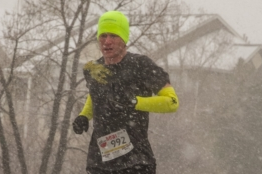LetsRun.com hosted a fun poll during December asking their readers to determine the best race of the past decade. It was set up in an NCAA tournament bracket style, with 64 races listed at the beginning and they gradually worked down to two. Your running knowledge would have to be deep to have significant knowledge of even half of the races, but like the NCAA tournament, only a handful of the races listed had a reasonable shot at winning. (One gripe—it was only men’s races that they featured which was a shame considering there were women’s races like Flanagan’s New York Marathon win, Kosgei’s world record, or Shaunae Miller’s fall across the finish line that inadvertently got her a gold medal in Rio.)
David Rudisha’s 800M world record of 1:40.91 at the 2012 Olympics prevailed in the final over Kipchopge’s 2018 world marathon record. Two factors were that Rudisha had no rabbits or pacers and several people behind him also set personal bests. Both races are remarkable accomplishments by the best runners at their respective distances but I was glad to see Rudisha’s win and it had nothing to do with whether it was a better race.
Shorter races, especially among people who are post-college, tend to get overlooked. It’s not that there isn’t appreciation for a blazing fast track or road race or that there aren’t people in those age brackets who savor the chance to run them. But, there is a heavy focus on the half-marathon and up.
I mentioned in a prior post that I would argue the 800M is the toughest traditional distance to race. It’s far too long to qualify as a sprint but it’s far too short to be a distance run. It’s appropriately qualified as middle distance, but there is nothing middle about the effort to run it well.
It speaks volumes that elite 400M runners have attempted the 800 and fallen short; their times might be better than most but relative to their 400 times, they’re way off. On the flip side, you might think someone who runs a lot at the mile to 5K distance would be able to rip off a quality 800M but I still recall the agony of the 800 and can tell you it’s not the case. It takes unique skill to run the 800M as it does any distance.
Runners who push themselves will hurt after every race, regardless of distance. The main difference is in how long it hurts. Elite sprinters can do two 100M in a day. 5K runners need roughly three days for their bodies to fully recover. Marathon runners need twenty-six. People who race shorter distances can do so more frequently and therefore they have more opportunities to get their goals. On the other hand, the shorter the race, the less room there is for error. Because your pace is more intense as the distance gets shorter, there is great satisfaction in finishing a race where you’ve paced yourself well when you’re near or at red-lining the whole way.
While it’s mostly running enthusiasts like me who read LetsRun.com and we already have an appreciation for all distances, I would hope that an 800M world record race topping a world record at a more popular distance would give us all reason to consider the challenge, skill, and reward in pushing ourselves at shorter distances. Some races may not carry the same glamour in their names, and it’s frustrating to come off of a mediocre or bad 5K or 10K without a more prestigious distance to use as proof of our training and accomplishment. But, training and planning for any race, at least if you’re doing it properly, requires much time and effort and when you meet a difficult goal at a shorter distance, it can be equally as thrilling as longer distances.

Running anecdotes, running food reviews, some race coverage, and more